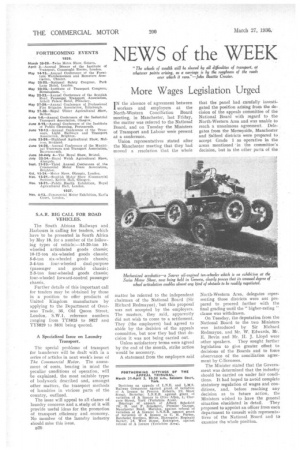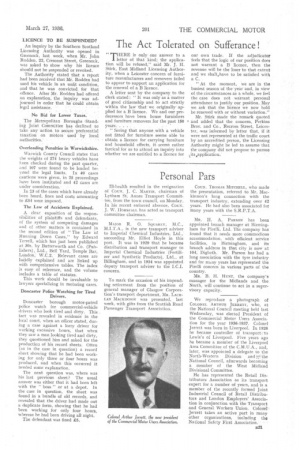NEWS of the WEEK
Page 34

Page 35

If you've noticed an error in this article please click here to report it so we can fix it.
"The wheels of wealth will be starved by all digculties of transport, at whatever points arising, as a carriage is by the roughness of the roads over which it runs."—John Beattie Crozier,
More Wages Legislation Urged
S.A.R. BIG CALL FOR ROAD VEHICLES.
The South African Railways and Harbours is calling for tenders, which have to be presented in South Africa by May 18, for a number of the following types of vehicle:-15-20-ton 10wheeled articulated goods chassis; 10-12-ton six-wheeled goods chassis; 5-6-ton six-wheeled goods chassis; 3-4-ton four-wheeled dual-purpose (passenger and goods) chassis; 2-3-ton four-wheeled goods chassis; four-wheeled forward-control passenger chassis.
Further details of this important call for tenders may be obtained by those in a position to offer products of United Kingdom manufacture by applying to the Department of Overseas Trade, 35, Old Queen Street, London, S.W.L reference numbers ranging from TY5825 to 5827 and TY5829 to 5831 being quoted.
A Specialized Issue on Laundry Transport.
The special problems of transport for launderers will be dealt with in a series of articles in next week's issue of The Commercial Motor. The assessment of costs, bearing in mind the peculiar conditions of operation, will be explained, the most suitable types of bodywork described and, amongst other matters, the transport methods of laundries in various parts of the country, outlined.
The issue will appeal toall classes of laundry concerns and a study. of it wilt provide useful ideas for the promotion of transport .efficiency and economy. No member of the laundry industry should miss this issue.
B20 I N the absence of agreement between workers and employers at the North-Western Conciliation Board meeting, in Manchester, last Friday, the matter was referred to the National Board, and on Tuesday the Ministers of Transport and Labour were present at a conference.
Union representatives stated after the Manchester meeting that they had moved a resolution that the whole
matter be referred to the independent chairman of the National Board (Sir Richard Redmayne), but this proposal was not accepted by the employers. The masters, they said, apparently did not wish to come to a settlement. They (the employers) had agreed to abide by the decision of the appeals committee, but now they had that decision it was not being carried out.
Unless satisfactory terms were agreed by the end of the month, strike action would he necessary.
A statement from the employers said that the panel had carefully investigated the position arising from the decision of the appeals committee of the National Board with regard to the North-Western Area and was unable to reach a unanimous agreement. Delegates from the Merseyside, Manchester and Salford districts were prepared to accept Grade 1 as operative in the areas mentioned in the committee's decision, but in the other parts of the North-Western Area, delegates repre; senting those districts were not prepared to proceed further with the final grading until the "higher-rating " clause was withdrawn.
On Tuesday, the deputation from the National Board to the two Ministers was introduced by Sir Richard Redrnayne, and Mr. W. Edwards, Mr.. E. Bevin and Mr. H. J. Lloyd were other speakers. They sought further legislation to give greater effect to decisions of the Boards and to farce observance of the conciliation agreement by C-licensees.
The Minister stated that the Government was determined that the industry should be carried on under fair conditions. It had hoped to avoid complete statutory regulation of wages and conditions, and, before reaching any decision as to future action, the Ministers wished to have the general
situation elucidated in detail. They proposed to appoint an officer from each department to consult with representatives of the National Board and to examine the whole position.
LICENCE TO BE SUSPENDED?
An inquiry by the Southern Scotland Licensing Authority was opened in Greenock, last week, when Mr. John Rodden, 22, Crescent Street, Greenock, was asked to show why his licence should not be suspended or revoked.
The Authority stated that a report had been received that Mr. Rodden had used his vehicle in an unfit condition, and that he was convicted, for that offence. After Mr. Rodden had offered an explanation, the inquiry was adjourned in order that he could obtain legal assistance. .
No Bid for Lower Taxes.
The Metropolitan Boroughs 'Standing Joint Committee has declined to take any action to. secure preferential taxation on motors used by local authorities.
Overloading Penalties in Warwickshire.
Warwick County. Council states that the weights of 274 heavy vehicles have heen checked during the past quarter, and 107 were found to be loaded beyond the legal limits. In 40 cases cautions were given, in 25 proceedings have been instituted and 42 cases are under consideration.
In 23 of the cases which have already been heard, fines and costs amounting to £54 were imposed.
The Law of Accidents Explained.
A clear exposition of the responsibilities of plaintiffs and defendants, of the system of computing damages and of other matters is contained in the second edition of "The Law 'of Running Down Cases," by Edward Terrell, which has just been published at 30s. by Butterworth and Co. (Publishers) Ltd., Bell Yard, Temple Bar, London,' W.C.2. Relevant cases are luCidly explained and are linked up with comprehensive tables. The index is easyof reference, and the volume includes a table of statutes.
This work should be invaluable to lawyers specializing in motoring cases.
Doncaster Police Watching for Tired Drivers.
Doncaster borough motor-patrol police watch for commercial-vehicle drivers who look tired and dirty. This fact was revealed in evidence in the local court, when an officer stated, during a case against a lorry driver for working excessive hours, that when they saw a man looking tired and dirty, they questioned him and asked for the production of his record sheets. Often (as in the case in question) a record sheet showing that he had been working for only three or four hours was produced, and when this occurred it needed some explanation.
The next question was, where was his last previous sheet? The usual answer was either that it had been left with the "boss " or at a depot. In the case in question, the sheet was found in a bundle of old records, and revealed that the driver had made out a duplicate form, showing that he had been working for only four hours, whereas he had been driving all night.
The defendant was fined £5.




























































































